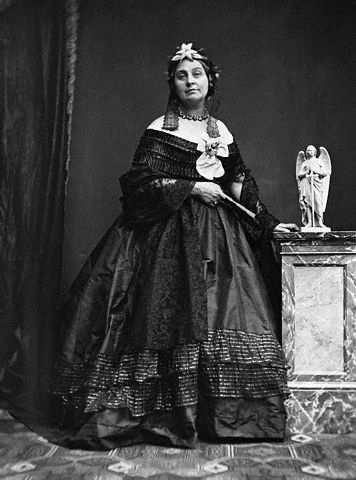Caroline Norton
b. 1808, London; d. 1877, London
Novelist and poet Caroline Norton experienced the oppressiveness of English family law firsthand. Married to the indolent and brutish George Norton, Caroline took up writing to supplement their income. The Sorrows of Rosalie was published in 1829 and received excellent reviews; within a decade, she was being hailed as the female Byron. Along with highly romanticized narrative poetry, she also published verse on social problems, including A Voice from the Factories (1836), an indictment of the exploitation of working-class children at the hands of greedy factory owners. Her first novels, The Wife and Woman’s Reward, were issued anonymously in 1835; heavily autobiographical, they address male abuse of domestic power. She left her husband that same year. Under English law, George automatically received custody of their children and refused Caroline access to them. In response, she lobbied her political allies and launched a war of words on the legal system; her efforts resulted in passage of the Infant Custody Bill in 1839, which granted custody of children under seven to the mother. Conflict with the odious George Norton forced Caroline into political activism again in 1853, when he demanded her inheritance and the proceeds of her publications. By law, he was entitled; as a woman, she had little recourse—she was a legal nonentity, with no right to own property, bring lawsuits, or make contracts. The court found for George Nortion, to which Caroline replied: “I do not ask for my rights. I have no rights; I have only wrongs” (Perkin, Victorian Women, 113). Following the verdict, she argued the case for property rights for divorced and separated women in two pamphlets: English Laws for Women in the Nineteenth Century (1854) and A Letter to the Queen on Lord Cranworth’s Marriage and Divorce Bill (1855). The Matrimonial Causes Act of 1857 incorporated many of her proposals. Although Caroline Norton delivered the first salvos against the patriarchal structure governing women’s lives in England, she was no friend to feminists, nor they to her.

Unknown artist. Caroline Norton, circa 1850–60. © Hulton-Deutsch Collection/CORBIS
Related Place Setting
Related Heritage Floor Entries
- Baroness of Adlersparre
- Gunda Beeg
- Annie Wood Besant
- Alice Stone Blackwell
- Barbara Bodichon
- Frederika Bremer
- Minna Canth
- Carrie Chapman Catt
- Minna Cauer
- Frances Power Cobbe
- Millicent Fawcett
- Augusta Fickert
- Margarete Forchhammer
- Charlotte Perkins Gilman
- Vida Goldstein
- Hasta Hansteen
- Amelia Holst
- Aletta Jacobs
- Annie Kenney
- Eliska Krasnohorska
- Mary Lee
- Bertha Lutz
- Constance Lytton
- Lucretia Mott
- Mary Mueller
- Carrie Nation
- Luise Otto-Peter
- Christabel Pankhurst
- Emmeline Pankhurst
- Sylvia Pankhurst
- Kallirhoe Parren
- Alice Paul
- Annie Smith Peck
- Emmeline Pethick-Lawrence
- Adelheip Popp
- Kathe Schirmacher
- Augusta Schmidt
- Katherine Sheppard
- Elizabeth Cady Stanton
- Lucy Stone
- Mary Church Terrell
- Alexandra van Grippenberg
- Frances Willard
- Victoria Woodhull
- Frances Wright